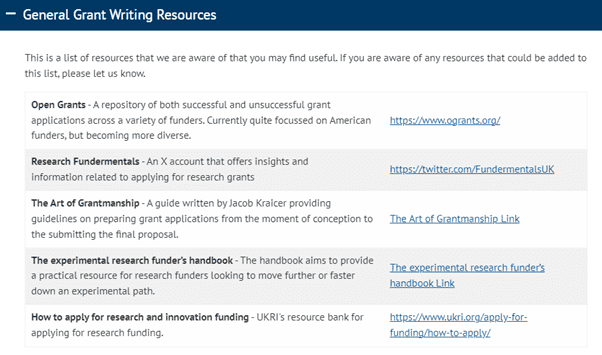How to Win a Research Grant: 12 Top Tips
- 25th July 2024
- Posted by: Breige McBride
- Categories: Bioinformatics, Uncategorised

If you want to know how to win a research grant, you have probably applied before without success. So, how can you improve your chances? Well, there are quite a few ways, which we have shared below.
However, we are going to skip the basics – like making sure you thoroughly research and adhere to the guidelines set by the funding agency, submitting by the deadline and writing clearly and concisely. If you have been unsuccessful before and are actively trying to improve your chances, it’s likely you are already getting these basics right and want to know what else you can do.
So, what else can you do?
Beyond the Basics
In this section we have collated tips that go beyond the basic necessities you need to cover for a successful grant application process (meeting deadlines, etc.). Instead, these tips intend to help you create a robust and convincing grant proposal. In later sections we go further, with tips to help your research proposal stand out and give it a competitive edge. For now though, let’s look at how to make your proposal a strong one.
1. Look at Previously Successful Grant Applications
Successful grant applications are a goldmine – you can review them to see what they have done well and glean extremely valuable insights. You may even notice trends, such as successful applications may tend to highlight cross-disciplinary collaborations. Then, you can apply such insights to bolster your own application.
One place you can find examples of successful grant applications is Open Grants. This is a repository of both funded and unfunded grant proposals from a range of funders.
2. Utilise Relevant Organisations
Strongly consider engaging with professional organisations, industry groups and academic societies related to your research area. Groups like these often have resources to help you find and win research grants, such as grant databases, workshops and mentorship programmes.
For example, universities often provide useful grant writing resources on their website, and in many cases you do not need any affiliation with the university in order to access the information they have compiled. For example, below you can see a selection of general grant writing resources which the University of Glasgow displays on their website:

3. Consider a Feasibility Study
Demonstrating the feasibility of your proposed work is something that reviewers may find particularly persuasive. One way to demonstrate feasibility is using bioinformatics approaches, to generate preliminary data that supports the hypotheses and objectives of your research proposal. For example, analysis of sequencing data could identify potential biomarkers for a disease and show preliminary results which support your proposed research direction.
As a bioinformatics company, we regularly provide bioinformatics support to clients who are looking to raise funding via grants. For example, we often support clients with analysis of their pilot data, so that this information can be included in, and support, an upcoming grant application. If you would like bioinformatics support for your own upcoming grant application, contact us for more information. We are always happy to advise on the most suitable analyses to demonstrate the feasibility of proposed work.
Tips to Stand Out
The world of research grant applications is highly competitive, so standing out from the crowd is a must. The below tips should help you do exactly that!
4. Emphasise the Problem
You know your research idea is great and could help solve a significant problem. Making sure the reviewers of your grant application also know that, can be the difference between winning or losing a grant. Therefore, it is crucial that you emphasise the problem your research hopes to address. Demonstrate how serious the problem is, how prevalent it is and the impact that funding your research could have on addressing it.
5. Showcase Innovation and Originality
You are familiar with the phrase “cutting-edge research” for a reason. This is the kind of research that funding agencies are eager to fund. So, it makes sense to highlight the areas of your research proposal that are innovative and original. Focus on identifying what sets your research apart. For instance, you can highlight any novel methodologies or interdisciplinary approaches you plan to employ.
6. Focus on Collaboration
Funding agencies often prioritise projects that foster collaboration, so demonstrate all the ways that your proposed research will do that. For example, you can highlight your research team’s diverse expertise and how cross-disciplinary partnerships within the team will enhance the scope and potential of your project.
7. Enhance Your Grant Application with Visualisations
Effectively visualising complex data can make your research proposal easier to understand and more compelling to reviewers. As a bioinformatics provider, this is something we can help with at Fios Genomics. If you would like our support to create informative visualisations that clearly demonstrate the significance and potential impact of your research, contact us today! We regularly provide our clients with visualisations such as heatmaps, network diagrams and volcano plots, to illustrate key points.
Mistakes to Avoid
Just as important as knowing what to do to improve your chances of grant application success, is knowing what not to do. So, below are some of the major mistakes you should avoid.
8. Avoid a Lack of Detail
Not including enough details in your research plan is a major mistake. Details that should definitely be in your research plan include a logical methodology, a clear timeline and a detailed budget. Any gaps in your research plan can be concerning to reviewers and may jeopardise your application.
9. Avoid Underselling Your Expertise
Funding bodies want their funding to make an impact, so they want to ensure they are funding those most capable of delivering research breakthroughs. This is why it is important to highlight your relevant experience, qualifications, publications and achievements. Also, don’t forget to mention the strengths of your research team. You should focus on demonstrating to funders that you and your team are competent enough to conduct the research you are proposing.
10. Avoid Underselling the Potential of Your Research
It is vital to ensure you clearly articulate and demonstrate the potential impact of your proposed research. You should highlight the novelty of your work, its relevance to the field and its broader implications for science and society. Failing to properly explain why your research is important significantly reduces your chances of securing funding.
11. Avoid Being Unprepared for Reviewer Questions
A failure to anticipate any concerns reviewers could have with your proposal can reduce your chances of securing funding. Therefore, you should ensure you are prepared to answer questions and concerns that could come up during the review process. By anticipating any concerns, you can ensure you have a well-thought-out response ready.
Bonus tip!
12. Set-Up For Success
Next time, before you get to the stage of choosing a research focus for a grant application, set yourself up for success by ensuring any future research direction is an innovative one. You can do this via a comprehensive literature review and gap analysis, or by asking a bioinformatics provider to do this for you. At Fios Genomics we regularly mine databases of existing research to identify trends and highlight gaps in current knowledge, for our clients*. This is invaluable knowledge to have when it comes to crafting a research proposal to address an unmet need. It is a great way to ensure your grant application stands out from the competition!
If you would like to know more about how we can support you with a literature review and gap analysis, contact us now and we will be happy to discuss your needs.
Win Your Next Research Grant
The 12 tips above should have you well on your way to a successful grant application. An important thread that connects the majority of the these tips is simply to keep the reviewers in mind when writing your proposal. Make sure they can easily understand what you plan to achieve, why it is important that you achieve it, and why they can be confident that you and your team have the ability achieve it.
Another thread that runs through the tips above is how incorporating bioinformatics into a research grant proposal significantly enhances its quality and competitiveness. By effectively harnessing the power of bioinformatics you can demonstrate the feasibility of your grant proposal, and furnish it with robust preliminary data and compelling visualisations. In short, bioinformatics can help you create a convincing proposal that is more likely to secure funding.
Of course, anyone submitting grant applications to funding bodies should keep in mind that this is always going to be a highly competitive process. There will always be many high-quality applications vying for limited funding. This means even well-crafted proposals are bound to be rejected. The important thing is to keep trying. Seek feedback from funding agencies if they reject your grant application and incorporate that feedback into your next application. Persistence and willingness to learn from experience is a tried and tested route to future success.
*Literature review and gap analyses at Fios Genomics require a specific defined focus. It is also important to note that results will only pertain to publicly available literature and databases unless alternative parameters are agreed. All reviews should be considered as snapshot of the data available at the time of the review.
Author: Breige McBride, Content and Social Media Manager, Fios Genomics
Reviewed by Fios Genomics Bioinformatics Experts to ensure accuracy
You may also be interested in:
Optimising IND Applications with Bioinformatics
Applications of Bioinformatics in the Pharmaceutical Industry
Why do Gene Therapies Cost so Much?

